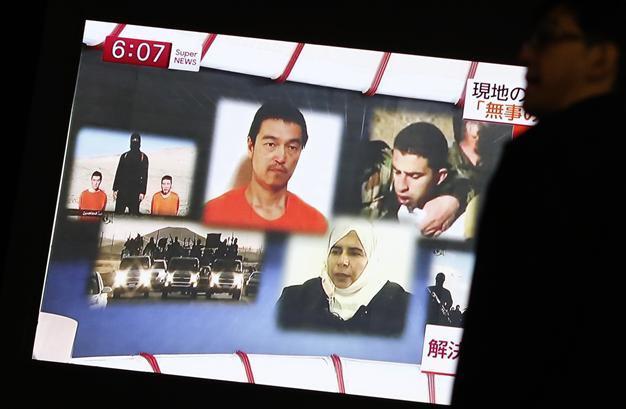ISIL silent as deadline passes with no swap
TOKYO - The Associated Press

A man walks past a TV screen broadcasting a news program about ISIL hostages Jordanian air force pilot Muath al-Kasaesbeh (top R) and Japanese journalist Kenji Goto (top C), along a street in Tokyo January 29, 2015. REUTERS Photo
Families of a Japanese journalist and Jordanian military pilot remained in limbo Jan. 30, a day after the latest purported deadline for a possible prisoner swap passed with no further word from the Islamic State of Iraq and the Levant (ISIL) holding them captive.
Japanese officials had no progress to report after a late night that ended with the Jordanian government saying it would only release an al-Qaida prisoner from death row if it got proof the airman was alive.
"There is nothing I can tell you," government spokesman Yoshihide Suga told reporters. He reiterated Japan's "strong trust" in the Jordanians to help save the Japanese hostage, freelance journalist Kenji Goto.
Suga said the government had been in close contact with Goto's wife, Rinko Jogo, who released a statement overnight pleading for her husband's life.
"I fear that this is the last chance for my husband, and we now have only a few hours left," Jogo said in a statement released through the Rory Peck Trust, a London-based organization for freelance journalists.
An audio message purportedly posted online by jihadis said the pilot, Lt. Muath al-Kaseasbeh, would be killed if Sajida al-Rishawi, the al-Qaida prisoner, was not delivered to the Turkish border by sunset on Thursday, Iraq time. It was not clear from the recording what would happen to Goto if the Iraqi woman was not returned by the deadline.
The authenticity of the recording could not be verified independently by the AP. But the possibility of a swap was raised Wednesday when Jordan said it was willing to trade al-Rishawi for the pilot.
After sundown in the Middle East, with no news on the fate of either the pilot or Goto, the families' agonizing wait dragged on.
Goto's wife said she had avoided public comment until the last minute to try to protect her daughters, an infant and a 2-year-old, from media attention.
Late Thursday, Goto's wife revealed that she had exchanged several emails with her husband's captors, and that in the past 20 hours she had received one appearing to be their final demand.
She urged the Japanese and Jordanian governments to finalize a swap that would free both hostages.
"I beg the Jordanian and Japanese governments to understand that the fates of both men are in their hands," she said.
In the Jordanian capital, Amman, the pilot's brother Jawdat al-Kaseasbeh said his family had "no clue" about where the negotiations stood.
"We received no assurances from anyone that he is alive," he told The Associated Press. "We are waiting, just waiting."
On Thursday afternoon, Jordan's government spokesman, Mohammed al-Momani, signaled that the hostage-takers had not delivered any proof the pilot is still alive.
Al-Rishawi, 44, faces death by hanging for her role in a suicide bombing, one of three simultaneous attacks on Amman hotels in November 2005 that killed 60 people. She survived because her belt of explosives didn't detonate. She initially confessed, but later recanted, saying she was an unwilling participant.
She is from the Iraqi city of Ramadi and has close family ties to the Iraqi branch of al-Qaida, a precursor of the ISIL. Three of her brothers were al-Qaida operatives killed in fighting in Iraq.
Jordan faces tough choices in the hostage drama.
Releasing al-Rishawi, implicated in the worst terror attack in Jordan, would be at odds with the government's tough stance on Islamic extremism.
However, King Abdullah II faces public pressure to bring home the pilot, who was captured in December after his Jordanian F-16 crashed near the ISIL's de facto capital of Raqqa in Syria. He is the first foreign military pilot to be captured since the U.S. and its allies began airstrikes against the Islamic State more than four months ago.
Jordan's participation in the U.S.-led airstrikes is unpopular in the kingdom, and the pilot is seen by some as the victim of a war they feel the country shouldn't be involved in.
Al-Kaseasbeh's relatives have expressed such views and accused the government of bungling efforts to win his freedom.
"They abandoned Muath, the son of the army!" chanted protesters gathered at a "diwan," or meeting place, in Amman for tribesmen from Karak, in southern Jordan.
The hostage drama began last week after the ISIL released a video showing Goto and another Japanese hostage, Haruna Yukawa kneeling in orange jumpsuits beside a masked man who threatened to kill them in 72 hours unless Japan paid a $200 million ransom. That demand has since apparently shifted to one for the release of al-Rishawi.
The militants have reportedly killed Yukawa, 42, although that has not been confirmed.
The crisis has prompted the Japanese Foreign Ministry on Friday to issue a warning to journalists, urging them not to gather at the border town in Turkey that was thought to be a potential crossing from Syria if a prisoner swap goes ahead.
It noted that ISIL militants were likely aware of who was in the area and that "we cannot dismiss the possibility of a kidnapping of Japanese journalists or of other risks to them."
"Under such circumstances, reporting on Turkish-Syrian border, even on the Turkey side, and of course in Syria, is likely to lead to unanticipated risks and be very dangerous," the statement said, reiterating earlier warnings. "We strongly urge you to refrain from visiting or staying in the area for reporting, and to leave immediately."
